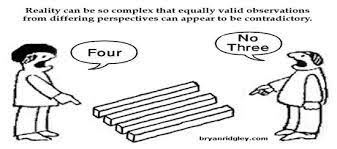Shifting Perspectives

Again, I will take the title of Chapter 10 in “The Art of Happiness” by HH the Dalai Lama to recap this week’s reading and I am also including thoughts from our Yoga Sutra Discussion group this past Sunday as the topics discussed are similar. I think as we look at the state of the world today, this concept of how we view and understand our experience of suffering is paramount.
“The ability to look at events from different perspectives can be very helpful. Then, practicing this, one can use certain experiences, certain tragedies to develop calmness of mind. One must realize that every phenomena, every event, has different aspects. Everything is of a relative nature.”
HH The Dalai Lama – Chapter 10 – The Art of Happiness
In the last Chapter, The Dalai Lama mentioned that a very Western view of life is to be without pain and full of happiness and pleasure. This does not bode well when you look at The Yoga Sutras as it mentions that “the wise see pleasurable experiences also tinged with sorrow.” On the surface this seems negative, but we easily see this effect when trying to hold on to something, someone, or even an idea too tightly. When we become obsessed with or have tunnel vision about anything, seeing change in it or challenge to it creates immense suffering within ourself.
He takes the example of “the enemy”, which these days I have been calling “the other” or “the THEY” in people’s arguments. It does not have to be such a specific person as an enemy, but even a perceived and possibly imagined enemy that can be even more destructive. Either way, carrying around such hate and anger and fear creates a worse situation for us than for that “other”, becoming paralyzed or even more dug in to our own narrow views.
“…how can there be anything more wretched than that? Carrying around the burden of such feelings of hostility and ill will. And do you really want to be that mean? If we take revenge upon one’s enemy, then it creates a kind of vicious cycle.”
“…hatred can be the greatest stumbling block to the development of compassion and happiness. If you can learn to develop patience and tolerance towards your enemies, then everything else becomes much easier.”
“In fact, the enemy is the necessary condition for practicing patience. Without an enemy’s action, there is no possibility for patience or tolerance to arise.”
HH the Dalai Lama – Chapter 10 – A New Perspective on the Enemy – The Art of Happiness
This argument makes a lot of sense to me. How do we know what pleasure is without an experience of pain? How do we know happiness without an experience of sadness? How can we know true compassion without seeing through our enemy’s eyes? We must be able to shift our perspectives accordingly depending on the situation and those we encounter.
And, as the Dalai Lama points out, this takes a supple and flexible mind, one that in yoga terminology does not “attach” itself to any one hard fast view or thought or thing. It is not that bad things won’t happen or that people will not annoy or anger you, but it is what we do with those experiences that really count. With perceptive awareness and discrimination, we may find that even those we see as hopeless have some redeeming quality. And, we may also catch our own minds, actions and reactions before we create any undo suffering for ourselves or others.
Through the practice of Yoga or the 8-fold Noble path of Buddhism, there is a striving for a balanced mind through any and all circumstances. This means avoiding extremes of any sort and remembering what Dr. Cutler lists as some basic beliefs that the Dalai Lama puts into practice : “A belief in the underlying goodness of all human beings. A belief in the value of compassion. A policy of kindness. A sense of commonality with all living creatures.”
I personally found the excerpt of the prayer mentioned in this chapter, The Eight Verses on the Training of the Mind by Langri Thangpa, quite profound, so will share it in closing…
“Whenever I associate with someone, may I think myself the lowest among all and hold the other supreme in the depth of my heart…
When I see beings of wicked nature, pressed by violent sin and affliction, may I hold these rare ones dear as if I had found a precious treasure…
When others, out of envy, treat me badly with abuse, slander and the like, may I suffer the defeat and offer the victory to others!…
When the one, whom I have benefited with great hope, hurts me very bad, may I behold him as my supreme Guru!
In short may I, directly and indirectly, offer benefit and happiness to all beings, may I secretly take upon myself the harm and suffering of all beings!…